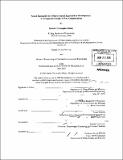Social enterprise as a rights-based approach to development : a comparative study of two organizations
Author(s)
Brine, Derek Christopher
DownloadFull printable version (9.116Mb)
Other Contributors
Massachusetts Institute of Technology. Dept. of Civil and Environmental Engineering.
Advisor
Balakrishnan Rajagopal and Susan Murcott.
Terms of use
Metadata
Show full item recordAbstract
Social enterprise has emerged as a potential new way to combat poverty and conduct development interventions. Social enterprise uses business methods to achieve financial sustainability for organizations seeking to create social impact. At the same time these organizations often operate in areas which are traditionally administered by governments. As such, there is potential to implement rights-based approaches which integrate human rights principles into organizational design, procedure and processes and put pressure on traditional responsibility bearers. Pure Home Water and Community Water Solutions are two social enterprises operating to ensure access to high-quality water in Northern Ghana that have not explicitly adopted rights-based approaches. This study explores key stakeholder conceptions about social enterprise and human rights through interviews with social entrepreneurs, government officials, and staff and customers of two social enterprises. In agreement with the literature on social entrepreneurs, the analysis reveals that social entrepreneurs attempting to achieve equal access to high quality water in Northern Ghana are resourceful individuals that pay close attention to context in designing their community engagement methods. In addition, in their thinking they appeal to human rights, recognizing the importance of the interconnectedness of rights and of the government as ultimate responsibility holder. However, there is a gap between thinking and action, as these organizations are disconnected from government involvement and focus on technical fixes in light of the social-structural issues that affect access to water in Northern Ghana. However, human rights can provide the framework for action which social enterprise needs. Rights can serve as a benchmark; an agreed upon ethical framework that can help to overcome the ambiguity that many of the research participants expressed about the 'social' nature of social enterprise. In addition, given the resourcefulness, dedication and motivation of the research participants, social enterprises may be well-positioned to operationalize rights-based approaches and to establish a much-needed dialogue between marginalized communities and formal human rights regimes. At the same time, incorporating rights into social enterprise presents some sticky ethical problems to social entrepreneurs, including adopting an approach that may ultimately result in their own obsolescence.
Description
Thesis (M.C.P.)--Massachusetts Institute of Technology, Dept. of Urban Studies and Planning; and, (M. Eng.)--Massachusetts Institute of Technology, Dept. of Civil and Environmental Engineering, 2010. Cataloged from PDF version of thesis. Includes bibliographical references (p. 127-133).
Date issued
2010Department
Massachusetts Institute of Technology. Department of Civil and Environmental Engineering; Massachusetts Institute of Technology. Department of Urban Studies and PlanningPublisher
Massachusetts Institute of Technology
Keywords
Urban Studies and Planning., Civil and Environmental Engineering.